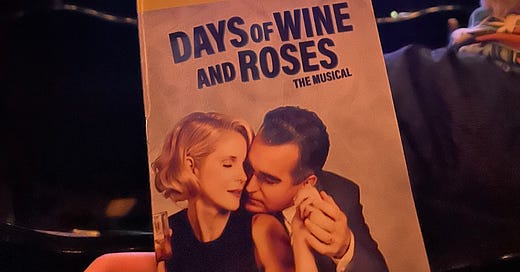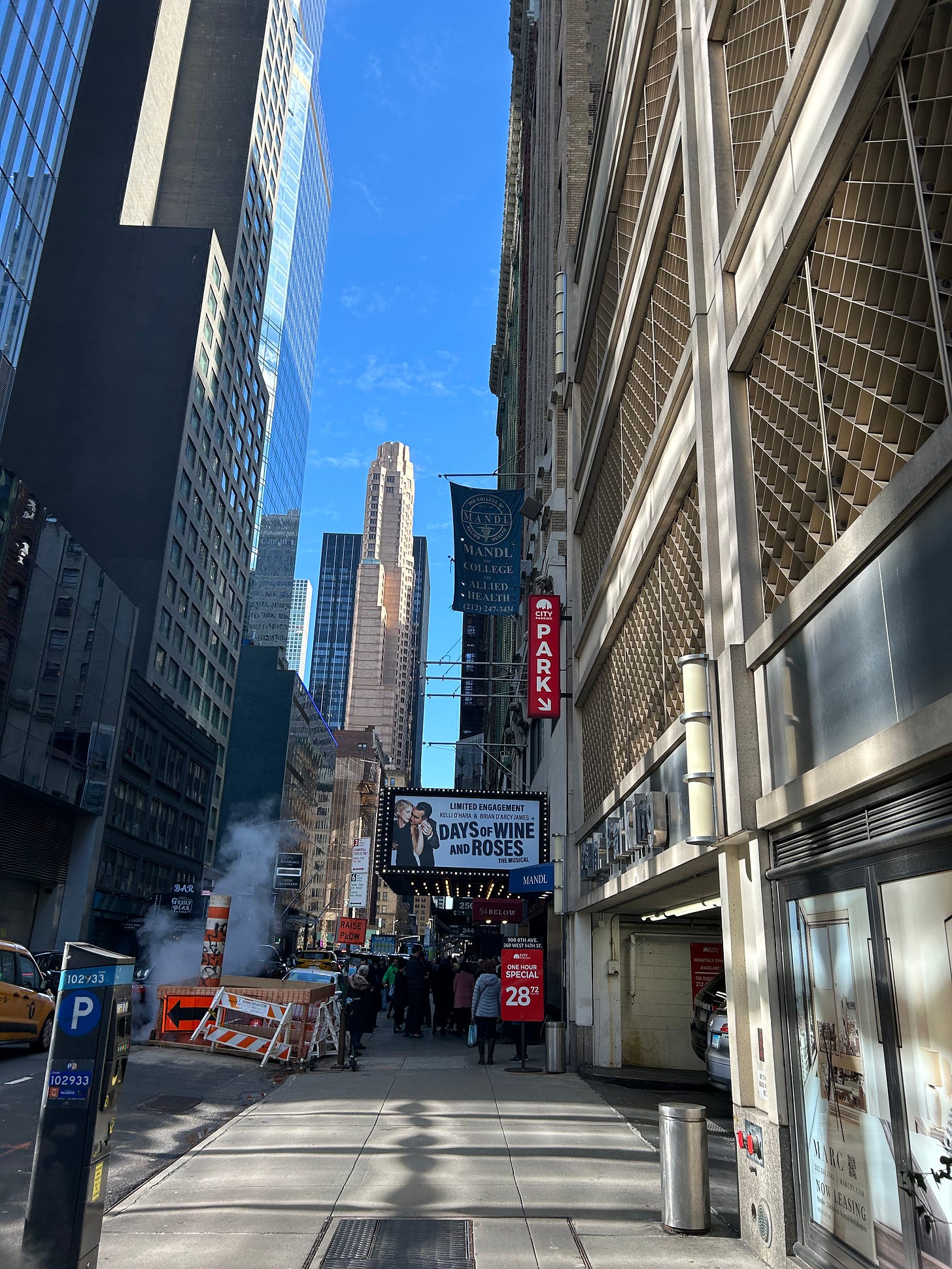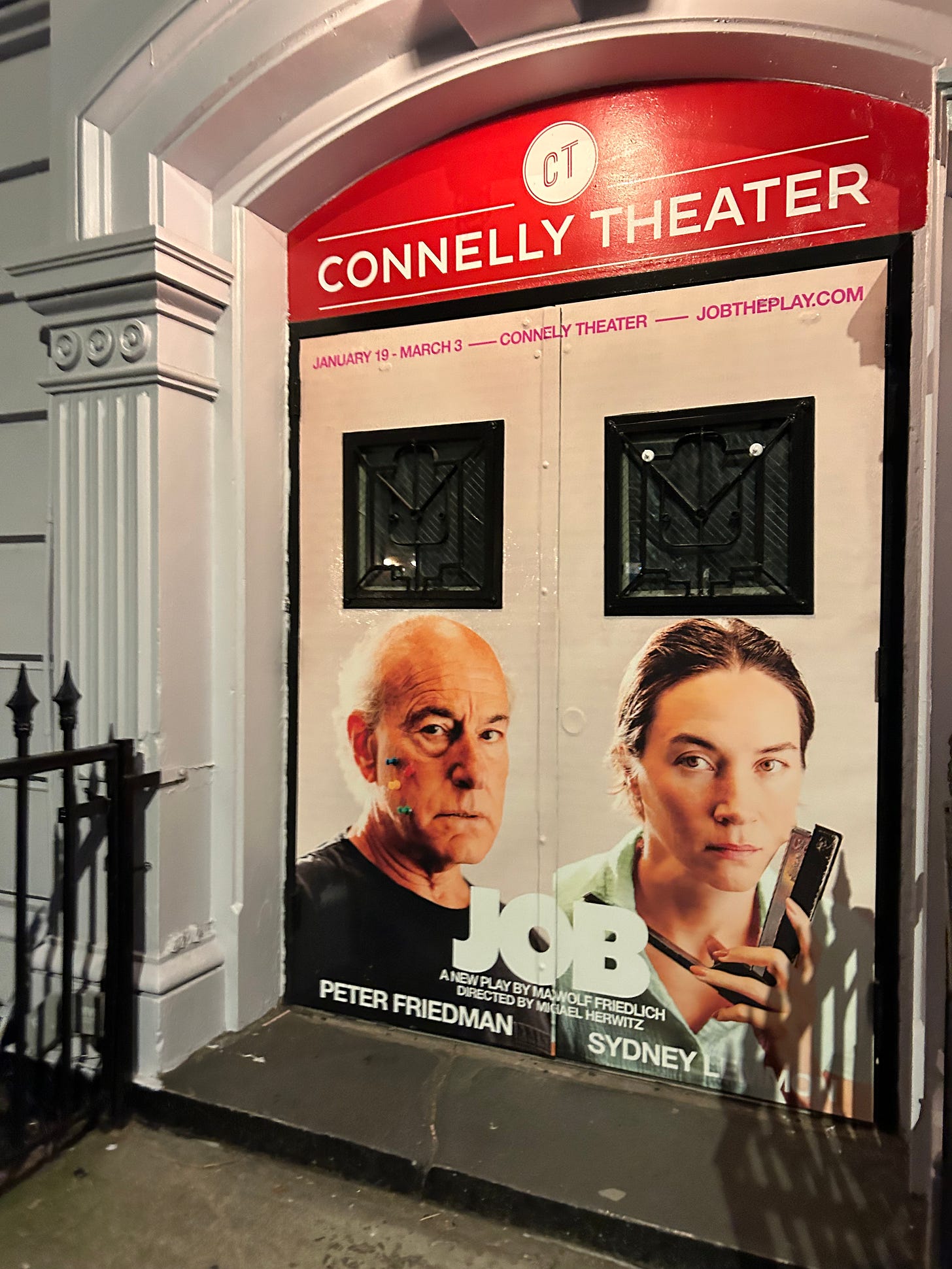“Days of Wine and Roses” and “Job,” or Best Only in Moderation
A musical and play that seem so different both ask: what happens when things go off the deep end?
Sunday at brunch, my grandfather informed me that people were going to forget about me if I didn’t publish a newsletter soon. So here we are! I’ve seen four shows in the last week and a half, and I’ve really enjoyed most of them. Today, we’re talking about the first two: “Days of Wine and Roses,” a musical based on a 1962 film starring two Broadway legends, and “Job,” a psychological thriller play that’s having its second Off-Broadway run in a year.
When I first looked at my calendar at these two shows, I thought there’d be nothing to compare them with; it’s funny how you can find connections between things in retrospect. Both “Days of Wine and Roses” and “Job” are about seemingly normal aspects of people’s lives that, when indulged in or taken too seriously, lead to their downfall.
In “Days of Wine and Roses,” the couple finds joy, connection, and celebration, accompanied by alcohol. Then, a few drinks turns into many, and suddenly enjoying alcohol becomes alcoholism, plaguing each other, their family, and their lives. In “Job,” a tech worker’s job is seemingly what changes her life for the better, giving her a purpose she’d never thought she’d find. Then, her obsession with her work leads her to a mental breakdown, once that lands her in the therapy session we see on stage.
These two shows are quite different in form (quite literally, as one is a musical and the other is a play) but they both left me feeling emotional and unnerved. Isn’t that what theater is for? To dramatize the things we see every day — and let us imagine what might happen if we indulged or obsessed a little too much?
Let’s start with “Days of Wine and Roses”:
How I found out about it: My grandparents. They love the opera, and Kelli O’Hara, one of the show’s stars, is both a Broadway and opera star.
Why I went: My grandparents. I was intrigued by the big-name leads for this one, but I’m not 100% sure if that would have enticed me enough to get a ticket.
How I got tickets: OK, you’re sensing a theme — my grandparents! This one is also on TDF, so you can see it for $60 if you have a membership there.
“Days of Wine and Roses” is a devastating, slow-burning tragedy. The musical, based on a film of the same name, tells the story of Joe Clay (Brian D’Arcy James) and Kirsten Arnesen (Kelli O’Hara), two people who meet while working at the same company. They fall in love, into alcoholism, and into complete ruin. In the beginning, Joe is a high-strung PR guy and Kirsten is a by-the-book, sober secretary. Within the first ten minutes of the musical, these two meet and go on a very straight-forward, let’s-get-into-family-trauma date that ends with Joe ordering Kirsten her first drink, which she enjoys.
Joe and Kirsten are happy, at first. I liked their goofy, fun dynamic, but it’s clear that alcohol is at the center. When Joe comes home to celebrate a promotion, it’s with two full bottles of alcohol; when Joe and Kirsten go to tell Kirsten’s dad that they’ve gotten married, they’re completely wasted.
Once the couple has a daughter, the happy picture gets completely wiped, and the alcohol becomes a clearer, stronger, darker part of the picture. Soon, we’re faced with the fact that both Joe and Kirsten are alcoholics, and it’s not only ruining their individual lives, but also their family, their marriage, and their careers.
Kelli O’Hara and Brian D’Arcy James aren’t always given the perfect material to work with, but their voices shine, and their love — which at times, borders on true dependency and enablement — for one another is believable, even if it’s not always well developed. To hear both of their voices, especially together, feels like a treat; however, it’s often with unforgettable music. I felt myself wondering why songs were placed at certain times, if included at all, but then I remembered it’s Kelli O’Hara singing (she sings a majority of the show’s songs, with a whopping seven solos).
Overall, the show tugs on the heartstrings, because it’s hard not to be upset when a bad habit so present in our everyday lives, so often present in star-studded musicals like these, ruins people’s lives. It’s heartbreaking to watch people slowly fall apart in front of you. Most people have a drink on a date or to celebrate something or at a party. Most musicals have fun, lively scenes that involve alcohol. When does it slip into something more, something that separates you from people you love, something deadly? “Days of Wine and Roses” lets us watch these two unravel until the point of no return.
Feeling uplifted yet? Let’s talk about “Job”:
How I found out about it: Instagram ads work on me.
Why I went: I’d been interested in seeing Job since it was Off-Broadway in the fall, mostly because it seemed “intense” and it had the actor who plays Frank from “Succession.” When I saw that it was having another run because of how popular it was, this time at another theater, I thought it was worth checking out.
How I got tickets: Ushering! I was trying to find discount tickets for this show, and saw that the Connelly Theater (where the show is now running) sometimes needs ushers, so I put my info into their online form. A few weeks later, the company manager reached out and asked to send my availability! They’re looking for more ushers (and the show just extended to March 23rd) so if you’re interested, I can forward the email so you can usher, too. It’s an easy commitment and you see the show for free.
“Job” starts with someone pointing a gun. Immediately, a young, former tech-worker Jane (Sydney Lemmon), a therapist, Lloyd (Peter Friedman), and you, the audience, are stuck in an 80-minute therapy session that seemingly no one can escape.
Starting with a gun is surely one way to keep an audience on the edge of their seats, but Max Wolf Friedlich’s writing keeps us there. In “Job,” Jane has been sent to a therapist because she had a mental breakdown at work (one that went viral, even), and the only way she can return to her job is to get an approval from Lloyd. This tension puts them at odds: Jane clearly does not want to be in therapy, but she needs it in order to continue what she seemingly loves (or needs). Lloyd is doing his job the best he can, working with a patient who doesn’t want to be one, held in his office by the threat of Jane’s gun.
What I loved most about both of these characters is how they bring the big issues to the specific. Jane is a millennial full of traditional “woke” speech (it’s no shocker that Friedlich went to Wesleyan), yet the play tackles issues like capitalism, racism, and big tech by making them personal. Jane sees the criticism of her former cushy tech job, but finds merit; she thinks it’s much better and more impactful than spending time doing absolutely nothing with her rich friends from college. Lloyd probes her in the best way a therapist should, encouraging until he needs to catch her in one of her lengthy the-world-is-so-messed-up-monologues. He calls her out in such traditional therapist ways, some that Jane can catch, some that leave her without a retort. At times, it slightly pushes toward preachy or cringy — I didn’t love Jane directly calling Lloyd a “boomer” — but overall the discussion of bigger issues stays quite close to each of the characters.
I think I would have liked the play if it was solely the two of them going back and forth, but at times, we extend from the office scene with cuts in lighting and loud, uncomfortable sounds. These are off-putting and disturbing, usually coming when the conversation has turned on Lloyd.
It’s not until the end of the play that those cuts truly make sense. The final twist of the show, which comes in just the last ten minutes, had my palms sweating; I don’t think I’ve quite heard the sound of silence from a crowd’s mouths hung open, agape. I haven’t felt that scared or horrified since the ending of “Appropriate,” one of my favorite shows last year. If you’re looking for a play that will make you hold your breath until the lights go down, this is the one to see.
Next up, two more plays that made me cry last week: “Jonah” and “Prayer for a French Republic.” Stay tuned!








